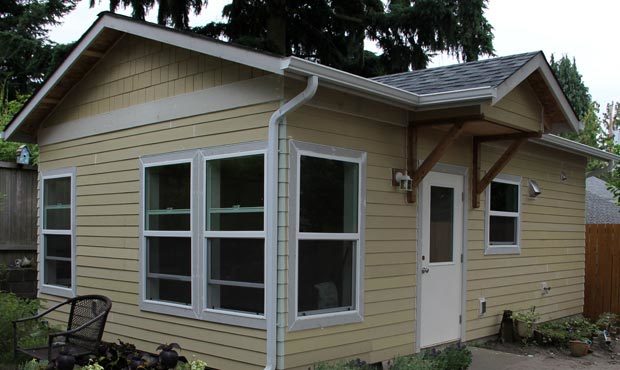AARP calls for partial Inslee veto on housing supply bill citing bad amendments on ADUs
May 10, 2021, 11:54 AM | Updated: May 11, 2021, 5:56 pm

(Courtesy of Backyard Cottage Blog)
(Courtesy of Backyard Cottage Blog)
Accessory Dwelling Units, better known as ADUs, have long been thought of as a key tool to curbing homelessness by increasing housing supply. But zoning laws and other rules that counties impose under the Growth Management Act often get in the way of allowing these mother-in-law structures on properties.
The Washington state Legislature has made efforts to change that in recent years, specifically making changes that allow for more of the units, including this year in the 2021 session.
Cathy MacCaul with the AARP of Washington says they strongly supported a new bill.
“We know that ADUs give not only older adults possibly some place to live that could be it has accessible features like no stairs or a smaller yard,” MacCaul explained. “When seniors want to downsize, they can find something that they can live in that’s also affordable, or they can use it as income, they could rent it out, they can also rent it out to family members, or rent their primary residence out to the family and live in the ADU.”
That’s why AARP initially supported Democratic Senator Marko Liias’ SB 5235, which essentially clears the path for more of these to be built in Washington state, and helps both fight and prevent homelessness.
“Often people refer to the missing middle,” MacCaul said. “And our region right now is continuing to go through a boom. When it comes to a real estate crisis, it’s unaffordable for most people and they have to continue to live further and further away from core areas, especially here in Western Washington. The same is the case in the Tri-Cities, in Spokane. And this is really just a very simple, straightforward, easy way to start getting more housing supply into the marketplace.”
MacCaul says AARP strongly supported the bill that would have eased rules regarding who can live in ADUs or the main structure on the same property until it came out of the House with what she calls bad amendments that she says actually do more harm than good.
“Basically moves the review of an ADU permit, to a public process, no other parts of construction, a home remodel or anything else goes through the same that kind of process,” MacCaul said. “The amendment adds on basically that any Neighborhood Association, any community, any town, any municipality can say no, we don’t want to have that through a public comment period.”
“It takes away that authority for the individual property owner to actually construct an ADU on their property, where as without these bad amendments, it would just be done like you would remodeling any other part of your house, you would go through the city, it would go through a review.
MacCaul said the changes also would require occupancy by the owner, which means they wouldn’t be able to immediately rent out the unit.
“Owner occupancy rules are really arbitrary. And they discriminate as well, because it really excludes a lot of people that would want to build ADUs and have them available as part of the housing supply. The other thing that is also troubling is the length of time that is added on to when all this takes effect. So basically, what they’re saying is that it’s four years down the road that ADUs could be constructed,” MacCaul added, explaining that would mean four to six years out depending where jurisdictions are in their planning timeline.
“The amendments really undermined the intent of the bill,” she said.
Even the bill sponsor, Democratic Senator Marco Liias, clearly had concerns with the changes.
“Sometimes, when we pass a bill out of the Senate and send it over to the House, they really transform it into something even better and stronger than it was before. This is not one of those cases, but this policy is still important and I think that it’s worth continuing to make progress on this issue,” Liias said before a final vote in the Senate.
The changes in the House came from a striking amendment from 42nd District Democratic Rep. Sharon Shewmake, who argued their necessity ahead of the final House vote.
“I’d like to see an end to these owner occupancy requirements, but I also recognize that these requirements are sometimes a bargaining tool used to mollify those who might otherwise be opposed to ADU policy. So we have a compromise. We’re making it harder to require owner occupancy requirements. But there’s still some limited ways that cities can use them. They aren’t arbitrary limits in accordance to the title,” Shewmake said ahead of the vote.
“I know this may not go as far as everyone here today would like. But in a world of imperfect tools, I do think this will result in more ADUs being built,” she added. “And it’ll also encourages cities that maybe don’t have to adopt a new policy but might be thinking about it to go ahead and take the plunge and open the gates to more housing types, which I think is really exciting with these additional tools.”
Democratic Rep. Gerry Pollet echoed that sentiment.
“There’s a compromise here. Instead of pre-empting, we’re saying plan and we’re giving a few off ramps, but they’re very limited. And we’re saying owner occupancy has to have a hardship exemption, and it can only be used in certain narrow circumstances. But it is also very important that we differentiate between when these units are being built and offered for profit tourism, and what we call Airbnb are short-term rental, versus being available for rental for people who need affordable housing in their communities. And this is a big step forward,” Pollet said.
But many other lawmakers pushed back, especially Republicans.
“This bill does not really get to where we need to be,” said 12th District Rep. Keith Goehner.
“If we’re really trying to create more housing, we have to provide incentives rather than additional restrictions,” Goehner added.
“We have nickel and dimed this bill to a point where it will do almost nothing,” argued Rep. Dan Griffey. “What it will do is it will require our bureaucrats and our local jurisdictions to write more rules and those rules will not incentivize building any accessory dwelling units.”
“We took a policy that was going to be great, that could be really good to really encourage more housing and we have made it obsolete before we even passed it,” Griffey added in final debate.
The bill passed the House on a 57-40 vote, and later the Senate 30-18.
“We have to take a bigger, broader holistic look at this issue, and this was just a very straightforward, pretty common sense idea of how to provide that missing middle housing,” MacCaul said.
But with these changes, AARP is now calling on Governor Inslee to block those “bad” amendments through the use of his veto pen.
In a letter to Inslee, AARP said: “Treating ADUs as a less desirable, inferior, type of housing — instead of a housing type that can benefit people of all incomes and backgrounds — will likely reinforce patterns of housing discrimination, and class and residential segregation.”
“We need creative solutions for inclusive communities that allow not only older generations of Washingtonians to age in place, but also, for families to live closer to where they work, to have access to housing that doesn’t have these restrictions,” MacCaul said.













